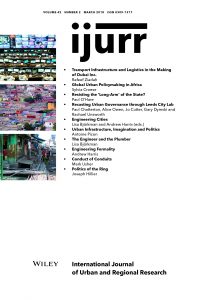A burgeoning literature looks into the processes and actors involved in the adoption and emulation of best practices and models of urban policy and development across the globe, often with the aim of attracting investment and making cities more competitive. With its focus on leisure, tourism and global capital, the redevelopment of the Bay of Luanda, in the capital of Angola, echoes the rhetoric, policies and projects underpinning such practices. Yet, a deeper interrogation reveals that the redevelopment forms part of a predominantly inward-looking project driven by the highest echelons of the national government and its ruling party. While these actors mimic and appropriate the language and tools of entrepreneurial cities, their aim is not necessarily to make the city more internationally competitive but to achieve domestic political legitimacy and stability. The argument presented in this article builds on McCann’s (2013) call for scholars to also consider the ‘introspective’ politics of urban policy boosterism from the perspective of a context in which power is highly centralized. The article thus contributes to a growing literature that advances more adequate and provincialized theorizations of urban policy and city governance in the global South, with a particular focus on the African context.

